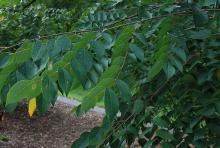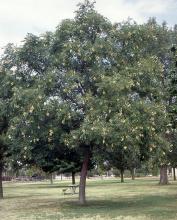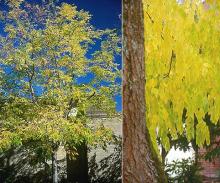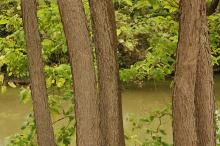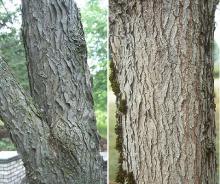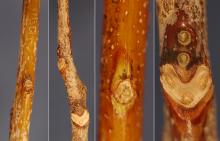Gymnocladus dioica
Common name:
Kentucky Coffeetree
Pronunciation:
jim-NO-kla-dus di-o-EE-ka
Family:
Fabaceae
Genus:
Synonyms:
Gymnocladus dioicus
Type:
Broadleaf
Native to (or naturalized in) Oregon:
No
- Deciduous tree, 40-50 ft (12-15 m), narrow in youth, aging to broad and contorted; thick stems. Bark rough. Leaves alternate, large bipinnately compound (to 0.9 m), leaflet entire. Usually dioecious - male and female flowers are on separate trees, sometimes trees will also have perfect flowers (male & female parts in the same flower). Flowers are greenish white, calyx 5-lobed, 4-5 petals and borne in many branched clusters, appearing in spring with the leaves; male flowers have 10 stamens with bright orange anthers and are in clusters 7.5-10 cm long; female flowers have a single pistil and are in elongated clusters 25-30 cm long. Fruit, leathery pods, 13-25 cm long, 2.5-10 cm wide (lima bean-like), are initially green, developing to brown, may persist for several years. Pith of stems, wide and salmon-pink to brown.
- Sun. Grows best in moist, rich, deep soil, but adaptable to a wide range of conditions.
- Hardy to USDA Zone 3 Native range from New York and Pennsylvania to southwestern Ontario and Minnesota, and south to Nebraska, Oklahoma, and Tennessee. Only a few cultivars available, one known as ‘Espresso’ has large doubly compound leaves, an arching habit; and is seedless. It was selected as the best of the Kentucky Coffetrees and planted along an entire street in Davis, California (Jacobson, 1996).
- Kentucky Coffeetree: seeds were used as a coffee substitute by early settlers in Kentucky ......then a Starbuck's opened. Thank goodness, the seeds have toxic properties.
- dioica: dioecious, separate male and female plants
- The specific epithet of this species, dioica, is probably the correct form, but it is often given as dioicus. The genus, Gymnocladus, is feminine, therefore the correct attribution must also be feminine, hence dioica; dioicus is the masculine form of the word. If I have offended any Latin scholars with this explanation...mea culpa, mea culpa.
- Oregon State Univ. campus: NW Weniger Hall
Click image to enlarge






